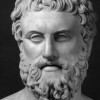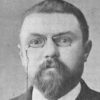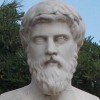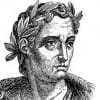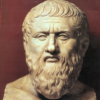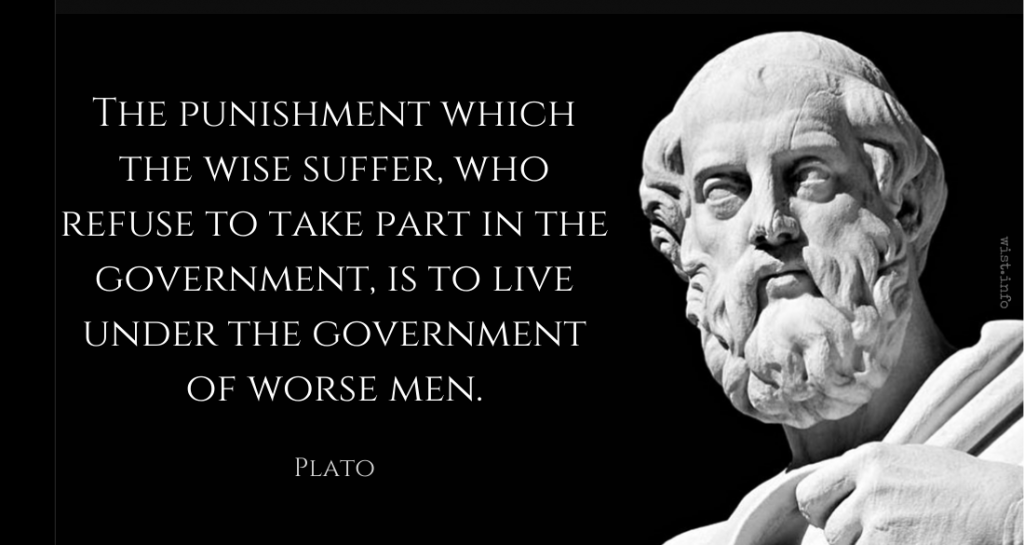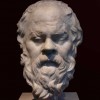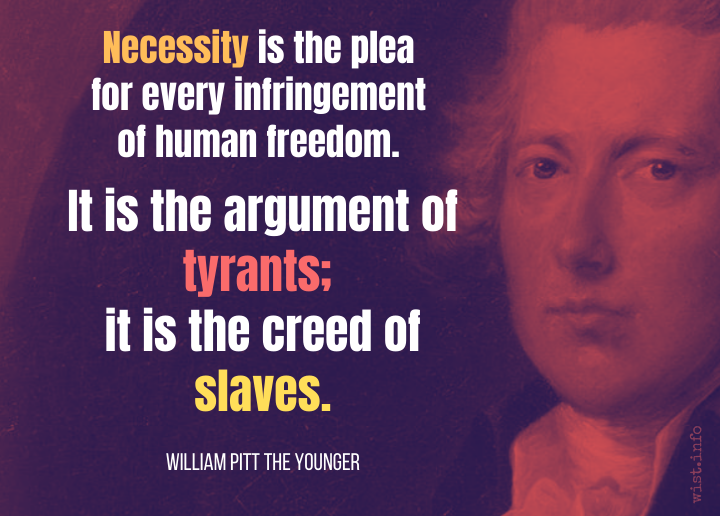We like to think of the universe as simple and comprehensible, but the universe is under no obligation to line up to our expectations.
Joel R. Primack (b. 1945) American astrophysicist, academic
(Attributed)
The world is round and the place which may seem like the end may also be only the beginning
Ivy Baker Priest (1905-1975) American politician [Ivy Baker]
Parade (1958)
(also attrib. George Priest)
JESSICA: Oh, Roger, you were magnificent!
ROGER: Was I? Really?
JESSICA: Better than Goofy.Jeffrey Price (b. 1949) American screenwriter, producer
Who Framed Roger Rabbit? (1988)
(with Peter Seaman; book by Gary Wolf)
A bad reputation is like a hangover
James E. Preston (b. 1933) American business executive
(Attributed)
“But the Great Plan can only be a tiny part of the overall ineffability,” said Crowley. “You can’t be certain that what’s happening right now isn’t exactly right, from an ineffable point of view.”
“It izz written!” bellowed Beelzebub.
“But it might be written differently somewhere else,” said Crowley. “Where you can’t read it.”
“In bigger letters,” said Aziraphale.
“Underlined,” Crowley added.
“Twice,” suggested Aziraphale.Terry Pratchett (1948-2015) English author
Good Omens, 6. “Saturday” (1990) [with Neil Gaiman]
(Source)
And the road to Hell is paved with good intentions.*
* This is not actually true. The road to Hell is paved with frozen door-to-door salesmen. On weekends many of the younger demons go ice-skating down it.
Terry Pratchett (1948-2015) English author
Good Omens, 6. “Saturday” (1990) [with Neil Gaiman]
(Source)
If you take the long view, the universe is just something small and round, like those water-filled balls which produce a miniature snowstorm when you shake them.*
* Although, unless the ineffable plan is a lot more ineffable than it’s given credit for, it does not have a giant plastic snowman at the bottom.
Terry Pratchett (1948-2015) English author
Good Omens, 6. “Saturday” (1990) [with Neil Gaiman]
(Source)
The way of the portable computer user is as a stony path strewn with plugs and sockets, all the wrong size.
Hastur was paranoid, which was simply a sensible and well-adjusted reaction to living in Hell, where they really were all out to get you.
Terry Pratchett (1948-2015) English author
Good Omens, 6. “Saturday” (1990) [with Neil Gaiman]
(Source)
Armageddon only happens once, you know. They don’t let you go around again until you get it right.
Terry Pratchett (1948-2015) English author
Good Omens, 3. “Wednesday” [Crowley] (1990) [with Neil Gaiman]
(Source)
Bringing about Armageddon can be dangerous. Do not attempt it in your own home.
God moves in extremely mysterious, not to say, circuitous ways. God does not play dice with the universe; He plays an ineffable game of His own devising, which might be compared, from the perspective of any of the other players (i.e., everybody), to being involved in an obscure and complex version of poker in a pitch-dark room, with blank cards, for infinite stakes, with a Dealer who won’t tell you the rules, and who smiles all the time.
Terry Pratchett (1948-2015) English author
Good Omens, 2. “Eleven Years Ago” (1990) [with Neil Gaiman]
(Source)
“I mean, maybe you just want to see how it all turns out. Maybe it’s all part of a great big ineffable plan. All of it. You, me, him, everything. Some great big test to see if what you’ve built all works properly, eh? You start thinking: it can’t be a great cosmic game of chess, it has to be just very complicated Solitaire. And don’t bother to answer. If we could understand, we wouldn’t be us. Because it’s all — all –”
INEFFABLE, said the figure feeding the ducks.Terry Pratchett (1948-2015) English author
Good Omens, 7. “Sunday” (1990) [with Neil Gaiman]
(Source)
Crowley speculating to Aziraphale about God's motivations in creating a flawed Universe.
In the end, as every human being who has ever breakfasted on their own in someone else’s kitchen has done since nearly the dawn of time, he made do with unsweetened instant black coffee.
Terry Pratchett (1948-2015) English author
Good Omens, 7. “Sunday” (1990) [with Neil Gaiman]
(Source)
The trouble with having an open mind, of course, is that people will insist on coming along and trying to put things in it.
“From what I remember,” replied Crowley, thoughtfully, “– and we were never actually on what you might call speaking terms — He wasn’t exactly one for a straight answer. In fact, in fact, He’d never answer at all. He’d just smile, as if He knew something that you didn’t.”
“And of course that’s true,” said the angel. “Otherwise, what’d be the point?”Terry Pratchett (1948-2015) English author
Good Omens, 6. “Saturday” (1990) [with Neil Gaiman]
(Source)
“Perhaps this isn’t just a test of the world,” said Crowley. “It might be a test of you people, too. Hmm?”
“God does not play games with His loyal servants,” said the Metatron, but in a worried tone of voice.
“Whooo-eee,” said Crowley. “Where have you been?”Terry Pratchett (1948-2015) English author
Good Omens, 6. “Saturday” (1990) [with Neil Gaiman]
(Source)
History balances the frustration of “how far we have to go” with the satisfaction of “how far we have come.” It teaches us tolerance for the human shortcomings and imperfections which are not uniquely of our generation, but of all time.
Lewis F. Powell, Jr. (1907-1998) US Supreme Court Justice (1972-87)
(Attributed)
The First Amendment exists to insure that freedom of speech and expression applies not just to that with which we agree or disagree, but also that which we find outrageous. I would not amend that great shield of democracy to hammer a few miscreants. The flag will be flying proudly long after they have slunk away.
Colin Powell (1937-2021) American military leader, politician, diplomat
Letter to Sen. Patrick Leahy (18 May 1999)
On a proposed flag-burning amendment. Full text.
A sense of shame is not a bad moral compass. I remember how easy it was for my mother to snap me back into line with a simple rebuke: ‘I’m ashamed of you. You embarrassed the family.’ I would have preferred a beating to those words.
Educators may bring upon themselves unnecessary travail by taking a tactless and unjustifiable position about the relation between scientific and religious narratives. … Profound but contradictory ideas may exist side by side, if they are constructed from different materials and methods and have different purposes. Each tells us something important about where we stand in the universe, and it is foolish to insist that they must despise each other.
All nature is but art unknown to thee,
All chance, direction which thou canst not see;
All discord, harmony not understood;
All partial evil, universal good;
And, spite of pride, in erring reason’s spite,
One truth is clear, Whatever is, is right.
A little learning is a dangerous thing;
Drink deep, or taste not the Pierian Spring:
There shallow draughts intoxicate the brain,
And drinking largely sobers us again.Alexander Pope (1688-1744) English poet
“An Essay on Criticism,” Part 2, ll. 15-18 (1711)
(Source)
In Greek mythology, the Pierian Spring was sacred to the Muses, representing the metaphorical source of knowledge.
The first line is more commonly paraphrased as "A little knowledge is a dangerous thing."
A man should never be ashamed to own he has been in the wrong, which is but saying, in other words, that he is wiser today than he was yesterday.
Alexander Pope (1688-1744) English poet
“Thoughts on Various Subjects” (1727)
This essay was published in Jonathan Swift, Miscellanies. It is sometimes incorrectly attributed to Swift, in his essay of the same name, published as ch. 16 in his The Battle of the Books And Other Short Pieces.
It is not the object of war to annihilate those who have given provocation for it, but to cause them to mend their ways; not to ruin the innocent and guilty alike, but to save both.
Polybius (203?-120 BC) Greek historian
Histories, Bk. V, 11.3
On Philip V of Macedon, conquering the Aetolians.Alt trans:
- "But to destroy what neither can do him any prejudice, nor will contribute to the defeat of the enemy; to burn temples, to break statues, and similar ornaments of a city, in pieces; certainly nothing but the wildest and most extravagant fury can be capable of such violence. It is not merely to ruin and destroy those who have done us injury, that we ought to declare war, in case we desire to be thought just and equitable; but only to oblige such people to acknowledge and make amends for their faults. The true end of war is not to involve in the same ruin the innocent and guilty, but rather to save both."
- "When men proceed to wreak their fury on sense less objects, whose destruction will neither be of advantage to themselves nor in. the slightest degree disable their opponent from carrying on the war, especially if they burn the temples of the gods, destroy their statues, and waste their ornamental furniture, what else can. we say of such proceedings except that they are the acts of men devoid of all feelings of propriety, and infected by frenzy? For it is in no way the object of war, at least among men who have just notions of their duty, to annihilate and utterly subvert those from whom they may have received provocation, but to induce them to amend that in which they acted amiss; not to involve the innocent and guilty in one common ruin, but rather to save them both."
- (Loeb Classical Library): "But to do wanton damage to temples, statues and all such works with absolutely no prospect of any resulting advantage in the war to our own cause or detriment to that of the enemy must be characterized as the work of a frenzied mind at the height of its fury. For good men should not make war on wrong-doers with the object of destroying and exterminating them, but with that of correcting and reforming their errors, nor should they involve the guiltless in the fate of the guilty, but rather extend to those whom they think guilty the mercy and deliverance they offer to the innocent."
Executive ability is deciding quickly and getting somebody else to do the work.
John G. Pollard (1871-1937) American politician
(Attributed)
To doubt everything or to believe everything are two equally convenient solutions; both dispense with the necessity of reflection.
Jules Henri Poincaré (1854-1912) French physicist, mathematician, philosopher
Science and Hypothesis [La Science et l’Hypothèse], Introduction (1902)
See also Korzybski.
When the candles are out, all women are fair.
Plutarch (AD 46-127) Greek historian, biographer, essayist [Mestrius Plutarchos]
Morals [Moralia], “Conjugal Precepts” #46
(Source)
Alt. trans.: "All women are alike when the lamp is put out."
The mind is not a vessel to be filled, but a fire to be kindled.
Grief has limits, whereas apprehension has none. For we grieve only for what has happened, but we fear all that possibly may happen.
Pliny the Younger (c. 61-c. 113) Roman politician, writer [Gaius Plinius Caecilius Secundus]
Letters, Book VIII, letter 17
My definition of an expert in any field is a person who knows enough about what’s really going on to be scared.
P. J. Plauger (b. 1944) American writer, computer scientist [Philip James Plauger]
Computer Language (Mar 1983)
The punishment which the wise suffer who refuse to take part in the government is to live under the government of worse men.
Plato (c.428-347 BC) Greek philosopher
Republic, Book 1, 347c
In Ralph Waldo Emerson, "Eloquence," Society and Solitude (1870).
Alt. trans.:More discussion here.
- "One of the penalties for refusing to participate in politics, is that you end up being governed by your inferiors."
- The Constitution Party (1952-68) used on their letterhead the variant, "The penalty good men pay for indifference to public affairs is to be ruled by evil men."
- "The price of apathy is to be ruled by evil men."
- "Those who are too smart to engage in politics are punished by being governed by those who are dumber."
In context (Plato in Twelve Volumes, Vols. 5 & 6 [tr. Shorey (1969)]):[346e] "Then, Thrasymachus, is not this immediately apparent, that no art or office provides what is beneficial for itself -- but as we said long ago it provides and enjoins what is beneficial to its subject, considering the advantage of that, the weaker, and not the advantage the stronger? That was why, friend Thrasymachus, I was just now saying that no one of his own will chooses to hold rule and office and take other people's troubles in hand to straighten them out, but everybody expects pay for that, [347a] because he who is to exercise the art rightly never does what is best for himself or enjoins it when he gives commands according to the art, but what is best for the subject. That is the reason, it seems, why pay must be provided for those who are to consent to rule, either in form of money or honor or a penalty if they refuse." "What do you mean by that, Socrates?" said Glaucon. "The two wages I recognize, but the penalty you speak of and described as a form of wage I don't understand." "Then," said I, "you don't understand the wages of the best men [347b] for the sake of which the finest spirits hold office and rule when they consent to do so. Don't you know that to be covetous of honor and covetous of money is said to be and is a reproach?" "I do," he said. "Well, then," said I, "that is why the good are not willing to rule either for the sake of money or of honor. They do not wish to collect pay openly for their service of rule and be styled hirelings nor to take it by stealth from their office and be called thieves, nor yet for the sake of honor, [347c] for they are not covetous of honor. So there must be imposed some compulsion and penalty to constrain them to rule if they are to consent to hold office. That is perhaps why to seek office oneself and not await compulsion is thought disgraceful. But the chief penalty is to be governed by someone worse if a man will not himself hold office and rule. It is from fear of this, as it appears to me, that the better sort hold office when they do, and then they go to it not in the expectation of enjoyment nor as to a good thing, but as to a necessary evil and because they are unable to turn it over to better men than themselves [347d] or to their like. For we may venture to say that, if there should be a city of good men only, immunity from office-holding would be as eagerly contended for as office is now, and there it would be made plain that in very truth the true ruler does not naturally seek his own advantage but that of the ruled; so that every man of understanding would rather choose to be benefited by another than to be bothered with benefiting him. "
The children now love luxury; they have bad manners, contempt for authority; they show disrespect for elders and love chatter in place of exercise. Children are now tyrants, not the servants of their households. They no longer rise when elders enter the room. They contradict their parents, chatter before company, gobble up dainties at the table, cross their legs, and tyrannize their teachers.
Socrates (c.470-399 BC) Greek philosopher
(Spurious)
Often claimed as a passage from Socrates via Plato, but actually a paraphrase from a synthesis of complaints about youth in antiquity by Kenneth John Freeman, in his 1907 Cambridge dissertation "Schools of Hellas: an Essay on the Practice and Theory of Ancient Greek Education from 600 to 300 BC." See here for more discussion.
A new scientific truth does not triumph by convincing its opponents and making them see the light, but rather because its opponents eventually die, and a new generation grows up that is familiar with it.
Max Planck (1858-1947) German physicist
Scientific Autobiography and Other Papers, trans. Frank Gaynor (1950)
Our Savior has nowhere promised to make us infallibly happy in this world.
Pope Pius XII (1876-1958) Roman Catholic pontiff
Letter
It is true, the bill is said to be founded on necessity; but what is this? Is it not necessity, which has always been the plea of every illegal exertion of power, or exercise of oppression? Is not necessity the pretence of every usurpation? Necessity is the plea for every infringement of human freedom. It is the argument of tyrants; it is the creed of slaves.
You shouldn’t speak until you know what you’re talking about. That’s why I get uncomfortable with interviews. Reporters ask me what I feel China should do about Tibet. Who cares what I think China should do? I’m a f—ing actor! They hand me a script. I act. I’m here for entertainment, basically, when you whittle everything away. I’m a grown man who puts on makeup.
Brad Pitt (b. 1963) American actor
Time, interview (13 Oct. 1997)







